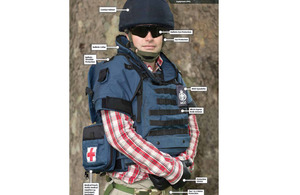Preparing civilian staff for operational deployments
Maintaining the safety, security and wellbeing of MOD civilian staff who deploy to conflict zones in support of front line operations is paramount.

A Ministry of Defence civilian wearing Personal Protective Equipment [Picture: Crown Copyright/MOD 2012]
Each year the Ministry of Defence Support to Operations (S2O) team enables some 650 civilian deployments and visits in support of military operations, primarily in Afghanistan.
Deployment is not without risk; although the majority of MOD civilians do not routinely operate outside of the major bases, they do live and work alongside military colleagues and are subject to many of the same risks and hazards as they are. Therefore the safety and security of deployees is paramount to S2O and no civilian post is established in theatre unless it has been agreed at Senior Civil Service level that the requirement and the benefits justify the risks.
To mitigate the physical risks, all deployees (including visitors) are issued with high-quality, military standard Personal Protective Equipment (PPE) to a standard relating to their role and duties in theatre. This includes body armour with ballistic plates (ECBA or the enhanced OSPREY Mk III), a helmet, gloves, ballistic eye protection, ear protection, pelvic blast protection and a General Service Respirator (GSR) designed to protect against any Chemical, Biological, Radiological or Nuclear (CBRN) threat.
Having the right kit ensures deployees can go where they are needed to provide support and are not a burden on our military colleagues.
In order to distinguish MOD civilians in theatre, the helmet and body armour are issued with distinctive blue covers and includes an MOD identifying epaulette. New utility and medical pouches are also provided; the medical pouch is fitted to the right-side of the body armour, consistent with where this is worn on military OSPREY for ease of identification in a crisis.
The issue of PPE is only part of the way S2O looks to protect MOD staff who deploy. S2O mandates that all civilian deployees undergo Pre-Deployment Training (PDT). Through this practical training, computer-based learning elements and medical and fitness assessments, civilians who deploy or are proved fit for their duties and prepared for any potential risks they may encounter.
Their learning is reinforced upon arrival in Afghanistan, as they undertake the Reception Staging and Onwards Integration (RSOI) training alongside their military colleagues. This training plays a vital part in refreshing existing learning, as well as helping individuals to acclimatise to the different climatic conditions.
The wellbeing of deployed civilians is also a primary concern. Deployees benefit from the excellent welfare packages provided to all MOD staff in theatre and to complement that, S2O also provide an Operational Stress Management package to civilians throughout the deployment process. This includes guidance for families, support from the Employee Wellbeing Service (EWS), access to enhanced psychological support services and guidance on how to improve individual resilience in preparation for deployment.
S2O recently mandated attendance at decompression for civilian personnel on return from Op HERRICK. Some individuals on return from operations have less difficulty adjusting back to routine work and family life, whilst others might take longer to adjust. Attending Cyprus for decompression provides the opportunity to readjust in a graduated and controlled manner. This is supported by research and experience with the military which found the majority who have attended decompression found it a useful and beneficial experience.